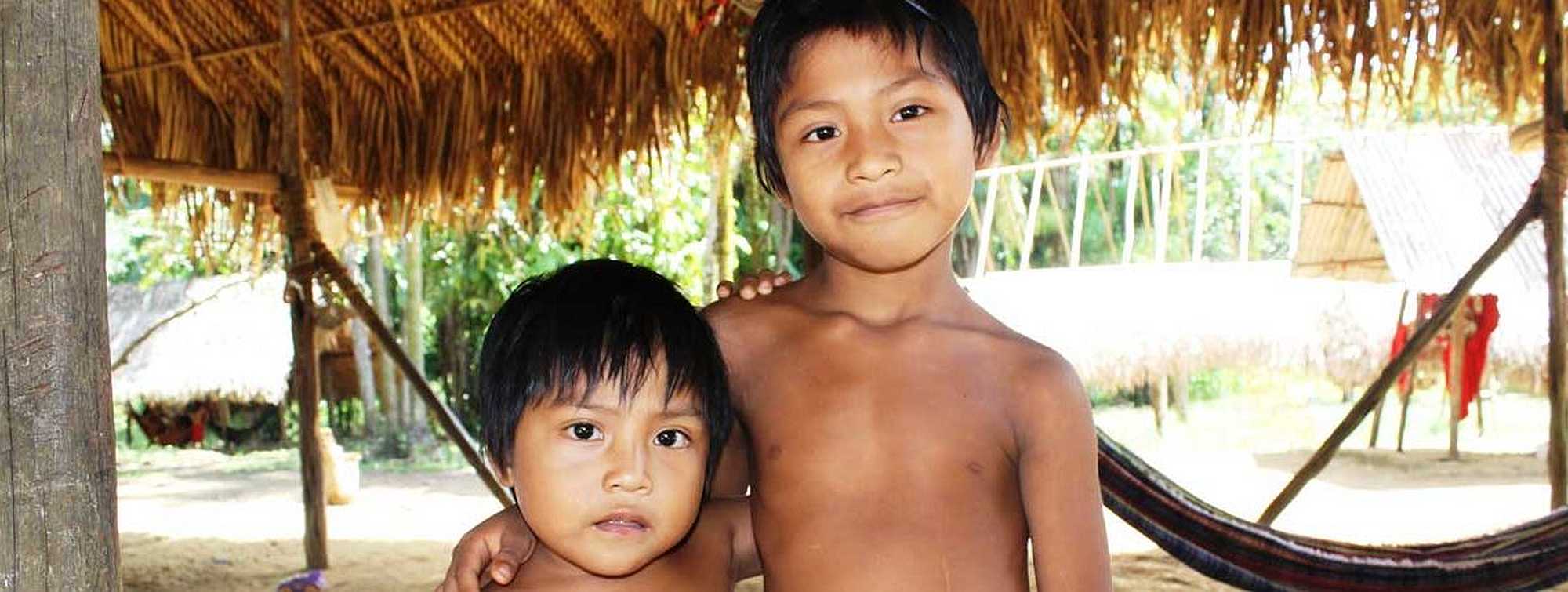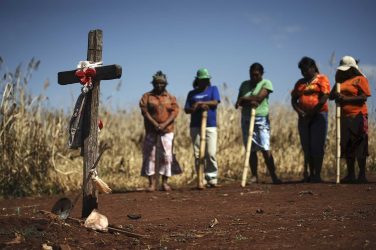Indigenous leaders in Brazil are acting to avert the devastating impact coronavirus could have on indigenous communities by canceling important advocacy events and utilizing technology and social media to conduct meetings and awareness campaigns – even as the Jair Bolsonaro government’s response to the viral outbreak comes under heavy attack.
Last week, Brazil’s largest annual indigenous gathering, the Free Land Encampment (ATL), held every April in Brasília, was suspended due to Covid-19 fears. The event – with its street demonstrations, rituals and speeches – attracted 4,500 indigenous leaders, activists and journalists in 2019, during which the movement’s protestors made their socioeconomic concerns known to a planet-wide audience.
This year, the capital’s streets will be empty, with no encampment to spotlight indigenous grievances against the Bolsonaro administration – two of whose top ministers and a dozen aides have contracted the virus. Indigenous “leaders could become contaminated and then take the virus back to their villages; this would be a disaster for indigenous health,” said Kleber Karipuna, an indigenous representative.
Brazil today is home to 900,000 indigenous people, speaking 274 languages and with widely differing cultural traditions; most groups live in the remote Amazon. So far, no indigenous coronavirus cases have been confirmed, and the majority of Brazil’s more than 1600 cases are concentrated thousands of miles away in its industrialized southeast.
However, Reporter Brasil is saying that at least one Pataxó indigenous person is suspected of having contracted the coronavirus in Bahia state in Brazil’s northeast, possibly exposed there while working at a hotel that receives foreign tourists.
Vulnerable immune systems, isolated communities lacking healthcare facilities, and poor basic sanitation in villages make indigenous communities easy targets for the highly infectious and potentially deadly disease, experts say.
Bolsonaro’s Response
Meanwhile, analysts and indigenous activists blasted the Bolsonaro administration’s coronavirus response, describing it as both late and insufficient.
“It’s a very delicate situation,” said Marivelton Baré, president of Brazil’s Federation of Indigenous Organizations of Rio Negro (FOIRN) in Amazonas state. “Instead of protecting indigenous people, this government harms and threatens them.”
The alert comes at a time when indigenous groups from across Brazil face rising legal challenges to their land rights from Brazil’s federal and state governments, as well as facing record high numbers of invasions and attacks by loggers, land grabbers and illegal miners.
As Covid-19 cases multiplied in Brazil, Bolsonaro labeled preventive action, such as the banning of mass events as “hysteria,” and put the economy first. “When you ban football and other things, you fall into hysteria. Banning this and that isn’t going to contain the spread,” he declared, a view strongly denied by epidemiologists.
The Amazonas Federal Prosecutors Office (MPF) has demanded that federal government bodies – including the National Indigenous Foundation (FUNAI), and Special Secretariat for Indigenous Health (SESAI) – provide access to information and implementation plans for a coronavirus prevention protocol to protect indigenous and traditional people.
SESAI said by email that its Covid-19 contingency plan, prepared this week, “establishes procedures for assisting indigenous people who may be affected by the coronavirus.”
But Kleber Karipuna, coordinator of Indigenous Organizations in the Brazilian Amazon (Coiab), berated the plan as “superficial” and said “we are pushing for SESAI to take more active measures.”
In 2019, indigenous women from across Brazil occupied SESAI in Brasília, protesting cuts and major changes to the program after a Bolsonaro decree.
Threat to Isolated Indigenous Groups
Experts have also reacted angrily to a two-page coronavirus ordinance enacted by FUNAI, Brazil’s indigenous agency, which critics say effectively allows regional FUNAI teams access to isolated, and sometimes uncontacted, tribes; something currently only permitted to a specialized FUNAI department, the General Coordinator of Isolated and Recent Contact (CGIIRC).
Contacting any of Brazil’s 115 known isolated tribes – most of which live in the very remote Javari Valley, a region as large as Austria, within Amazonas state near the Peru border – requires extreme sensitivity due to the health risks posed to populations whose immune systems typically lack resistance to disease.
In a just issued six-page document, Brazil’s Federal Prosecutors Office (MPF) called on FUNAI to revoke the passage of its coronavirus decree allowing regional teams access to isolated tribes, giving a deadline of five days.
Accusations that the Bolsonaro government wants to force contact with such groups – abandoning an effective, three-decade, “no contact” FUNAI policy – have grown in recent weeks following the appointment in February of anthropologist and former evangelical missionary Ricardo Lopes Dias to FUNAI’s Isolated tribes department, along with revelations by Intercept Brasil that he was handpicked for the job in hope that he would evangelize native peoples.
“Either they change this [appointment] in the next few hours, or they’re showing that their intention is to contact isolated indigenous,” a source with knowledge on the subject said off the record. Dias was an active missionary with the notorious New Tribes Mission, established in 1942, just renamed Ethnos360, which recently bought a helicopter and announced plans to contact and convert isolated tribes to Christianity – putting them at risk of Covid-19.
Indigenous peoples throughout Brazil’s history, most recently during the 1964-85 military dictatorship, have seen populations ravaged by infectious diseases after forced contact with loggers, rubber tappers, cattle ranchers, and settlers, as well as failed contact programs launched by state institutions.
In an interview with Amazônia Real, Douglas Rodrigues, a doctor working with isolated indigenous peoples for more than 50 years, described respiratory diseases like coronavirus as “great villains” resulting in indigenous genocide.
Rodrigues also advised on best practices to avoid coronavirus – like regularly washing hands for 20 seconds – on the latest edition of Copio, Parente, a radio service and podcast aimed at indigenous audiences, produced with Brazil’s Social Environment Institute (ISA).
Taking Action
In the face of the Covid-19 crisis, indigenous leaders across Brazil have promised to stay vigilant. In a statement, Sonia Guajajara, executive coordinator of Brazil’s Articulation of Indigenous Peoples (APIB), said:
“We already face a systematic virus with institutionalized genocide, and an authorized ethnocide with the denial of our territories. We will resist this pandemic with the collective care of our communities.”
Indigenous online groups are promoting coronavirus awareness campaigns; warning to limit unnecessary circulation between communities and to use proper hygiene practices, while some groups have even imposed village quarantines.
The state government in Amazonas – the Brazilian state with the largest indigenous population – published a decree this week suspending, for the next 15 days, all passenger river transportation except in cases of emergency and urgency; boats are the main form of transport in Amazonas, where there are few road connections.
The city of São Gabriel da Cachoeira (the municipality with the biggest indigenous population in Brazil), decided this week to create a Committee for the Prevention and Confrontation of Covid-19, with the mayor and FOIRN. In the decree, the municipal government prohibited the entry of people from European countries and others on “suspicion of imminent risk.”
Further south, in Mato Grosso do Sul (an agricultural state bordering Paraguay, with the second biggest indigenous population in Brazil), observers remain especially concerned about native peoples living on the Dourados Indigenous Reserve, one of the country’s most densely populated with more than 16,000 indigenous people crammed into roughly 3,500 hectares (8,648 acres), just 4 kilometers from the city of the same name – an urban center of 210,000 people, where at least one coronavirus case has been confirmed.
Tatiane Klein, an anthropologist working with the Guarani Kaiowá indigenous group in Dourados said that many native people work in the city as garbage collectors or in construction, and will likely need to keep working, increasing their coronavirus exposure.
Indianara Ramires Machado Kuña Rendy’i, a Guarani Kaiowá nurse living on the Dourados Reserve and a member of the Young Indigenous Action (AJI) group, said that lack of water access, poor health conditions, and malnourished children make the territory particularly susceptible to a Covid-19 outbreak.
“If we begin to have cases inside the reserve, with the vulnerable patients we have there, we are worried about a real catastrophe,” she said.
Additional reporting for this story was provided by Débora Menezes.
This article appeared originally in Mongabay – https://news.mongabay.com





